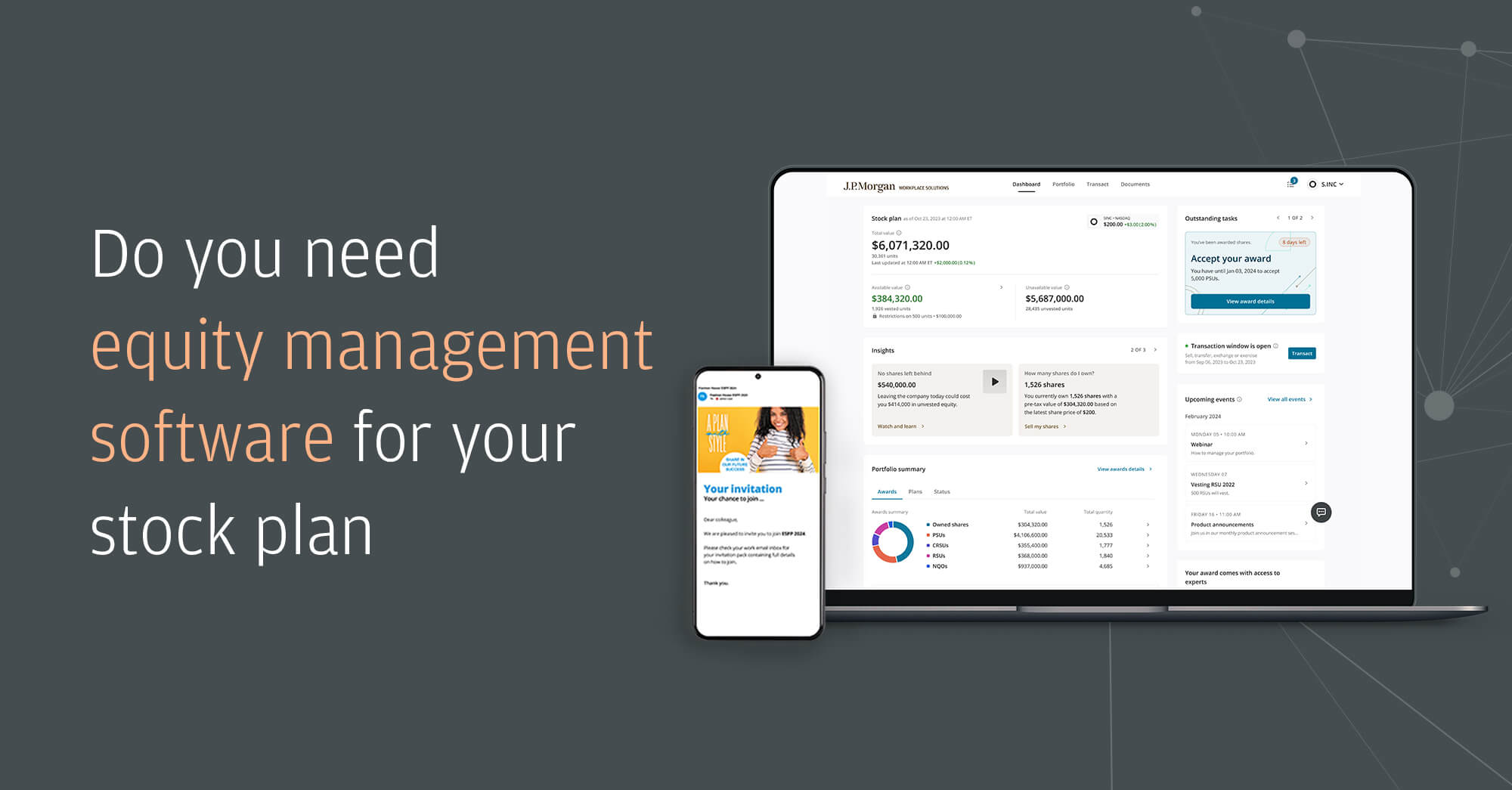Is it necessary for businesses to manage their stock plan using software? The short answer is it’s “not necessary”. However, there are many good reasons for companies to digitize their stock plan management including task automation, more efficient reporting, data security and improved employee engagement.
Here, we’ll articulate which types of companies commonly opt for a software solution and which don’t, as well as some of the reasons behind these decisions.
Types of companies that commonly use equity management software
1. Public companies
Public companies typically use more equity awards, have a wider variety of plan types and tend to have more participating employees. As a result managing these large amounts of dynamic (employee and equity) data manually on a spreadsheet can easily allow for human error. This could occur due to inputting information incorrectly, forgetting to include an update, or because multiple file versions are circulating internally. Any of these errors could have major consequences, resulting in inaccurate reporting or wrong tax filings.
A software solution can simplify the complexities of stock plan administration for you. It streamlines the day-to-day execution of transactions, with full automation of any changes, and equity award activities. It also empowers your employees to engage with and manage their awards online via their employee portal, all without having to send emails back and forth.
If you offer a broad-based plan, like ESPP which is common among public companies, there are many obvious benefits to adopting equity management software:
- Automatically track ESPP tasks, e.g. grant acceptance and enrollment
- Easily set up the plan design and rules
- Simplify global ESPP administration
- Enable employees to track their plans, change plan contributions, withdraw/suspend from the plan, trade their ESPP awards, learn more about ESPPs, etc
- Save time by reducing a large amount of manual tasks
In addition to equity administration, having access to a reporting suite built into the software can be a great addition to many public companies. This feature usually contains multiple audit-ready financial reports and functions, e.g. EPS, Fair Value Valuation, Disclosures, enabling you to access them with just a few clicks and helping you stay compliant with annual audits.
2. Pre IPO companies
The road to IPO is a long one, with many important steps along the way. As a result Pre IPO companies need to be diligent about monitoring every aspect of their business – including their equity compensation offerings.
You need to know the details of what equity compensation grants you currently use including their eligibility and all of the design details. Also, planning ahead to after your company goes public, what the compensation structure will look like at that stage needs to be answered too, e.g.
Executive equity compensation at a public company is important. Not only are the details required by regulators like the SEC, but not getting them right could also bring negative media or public attention. There’s been an increased public scrutiny over executive compensation packages in recent years, especially in relation to S&P 500 companies.
Apart from these, careful consideration and review of your offerings could significantly benefit you and your business as they may help you retain, reward and attract skilled employees in the war for talent.
Converting from private to public constitutes a massive change. That’s why pre-IPO companies typically onboard a stock plan service provider and use its technology to help manage and migrate their stock plans before they encounter many of these headaches.
3. Private companies (>300 employees)
In the past few decades, the use of equity compensation in private companies has increased. Why do they follow their public peers? Because they want to stay competitive in a talent war and retain employees.
Equity awards, such as stock options, can potentially offer employees greater financial awards than fixed cash-based bonuses, if the company value grows over time, making them a more attractive perk. This type of equity award is also considered a long-term incentive, meaning employees need to fulfil a particular job tenure – usually 3-5 years – in order to receive the full award.
So, if you plan to remain private and want to offer employee equity, consider using stock plan software to enjoy the benefits discussed above.
4. Companies operating in multiple jurisdictions
When you offer equity compensation to employees who are based both domestically and globally, your stock plan will look more complicated as it involves multiple jurisdictions . These may have different regulations in relation to stock plans.
Using a spreadsheet as a recordkeeping tool to manage thousands of employee datasets, multiple equity awards/plans and different vesting schedules, tax rules, regulations, and all the other moving elements in a multi-jurisdictional employee stock plan is not a practical option.
Instead, leveraging the technology provided by a stock plan vendor can help you manage this level of stock plan complexity. Their local knowledge and experience can also help you understand the different laws and regulations in each jurisdiction.
Types of companies don’t often use a software solution
From pre-IPO companies to private companies and public companies, we can see how stock plan technologies can effectively manage employee stock plans and unlock the full potential of equity compensation.
But some companies, like very early-stage startups that haven’t started to hire their first set of employees, may only use a spreadsheet to keep recording their stock ownership among a few founders as a starting point. If you’re one of them, remember to use consistent naming conventions, update your file whenever something happens, and send the updated one to relevant stakeholders, like your company lawyer.
As a good long-term solution, early adoption of a software program enables you to enjoy the benefits of automating the complex process sooner. Some only come around to the software solution after enduring many problems of manual input-related errors and massive time commitment that can come with trying to keep the plan up to date.
We have the experience and knowledge to be your partner and provide you with the automated equity management solutions at J.P. Morgan Workplace Solutions. Contact us if you want to learn more about how we can help you manage equity compensation.
Please Note: This publication contains general information only and J.P. Morgan Workplace Solutions is not, through this article, issuing any advice, be it legal, financial, tax-related, business-related, professional or other. J.P. Morgan Workplace Solutions’ Insights is not a substitute for professional advice and should not be used as such. J.P. Morgan Workplace Solutions does not assume any liability for reliance on the information provided herein.



